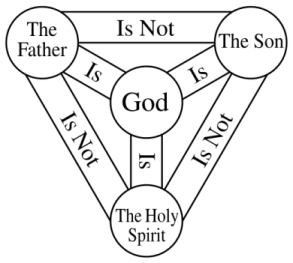It is if you cannot provide proof that there is a mistranslation.
He spoke "of Himself" in the plural, then inspired Moses to speak of Him in the singular?
God is not the author of confusion.
Of course not. So, we have to make sense of what he has revealed to us. And what he has revealed to us in these two verses is that there is diversity within the unity.
Singular pronouns don't allow any possibility of a trinity. Sorry.
Prove it. I'll give you a hint--you can't, because no one can. I'll leave you to do the study and figure out why.
If I say "We need to wrap up this thread.", am I speaking of myself in the plural? Of course not!
But, you aren't God either.
The angels were present with God at Creation.
Job 38:4
Firstly, we're made in the image of God, not of angels. Secondly, angels are created beings. Thirdly, what does Job 38:4 have to do with your statement?
Then Moses spoke of God in His True singular nature.
There is one god in the trinity definition, but three persons. Three is plural.
Yes, it is.
It wouldn't make a lick of sense to refer to the Father, Son and Holy Ghost as He if the trinity were a legit Biblical concept.
Why not? One of the foundations of the Trinity is monotheism--that there was, is, and ever will be only one God. To refer to God in the plural would suggest polytheism and create that confusion that God is not the author of.
And all of that ignores the fact that none of your argument holds a single drop of water without any passage in all of Scripture that plainly defines and explains a trinity concept for God.
And, yet, you have left most of my arguments unaddressed. Why is that? If none of them "holds a single drop of water," they should be easy to refute.
It is hard not to notice that you once again left my arguments unaddressed, regarding John 1:1.
You are arguing upon a non-existent foundation.
You must first establish that it is a legit concept that is even taught in Scripture to begin with, THEN, and only then, can you legitimately argue which verses are, or are not, referencing it.
You don't even have the first piece of the puzzle.
That's what I've been trying to do but it doesn't help when you leave my arguments largely unaddressed.
Here is a basic definition of the Trinity:
“Within the one Being that is God, there exists eternally three coequal and coeternal persons, namely, the Father, the Son, and the Holy Spirit.” (James R. White,
The Forgotten Trinity, p.26)
That leads to these three foundations:
1. Monotheism—there is only one God
2. There are three divine Persons
3. The Persons are coequal and coeternal
(ibid., p. 28)
There are numerous passages in Scripture to support each, which is precisely what I have been trying to discuss. I assume you will agree with the first two foundations but disagree with the third, correct?





